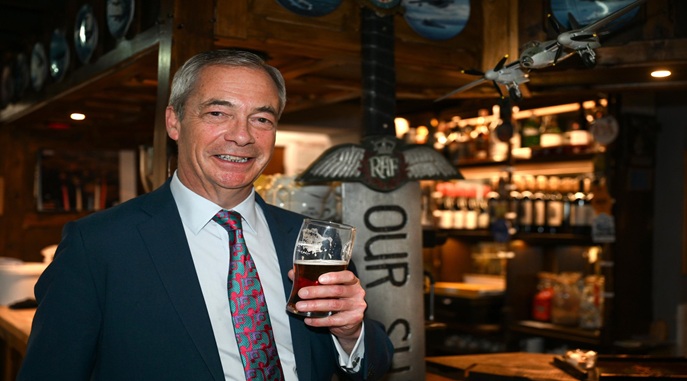
Nigel Farage, the Reform UK leader and Clacton MP, has won a significant victory against NatWest Group, receiving an undisclosed payout to settle a contentious debanking row that erupted in 2023.
The dispute, which centred on the closure of Farage’s account with NatWest’s private banking arm, Coutts, due to his political views, has concluded with an apology from the bank and a resolution that ends nearly two years of legal and public wrangling.
Origins of the Debanking Saga
The controversy began in June 2023 when Farage publicly revealed that Coutts intended to close his personal and business accounts, offering no initial explanation beyond a standard notice.
NatWest, which owns Coutts, later claimed the decision was commercially driven, citing Farage’s failure to meet the bank’s £1 million investment or £3 million savings threshold after his mortgage expired.
However, a 40-page dossier obtained by Farage through a subject access request told a different story.
The internal document, prepared for Coutts’ Wealth Reputational Risk Committee, labelled him a “disingenuous grifter” with “xenophobic, chauvinistic, and racist views,” asserting that his public stances—particularly on Brexit, immigration, and his support for Donald Trump—posed a “significant reputational risk” and clashed with the bank’s commitment to inclusivity.
Farage fiercely contested these characterizations as an “appalling slur,” arguing that the closure was a politically motivated attack on his freedom of expression.
The revelation of staff messages calling him a “crackpot” and “awful human being” further inflamed the situation, exposing a culture of disdain within the bank and amplifying public outrage.
Fallout and Leadership Casualties
The debanking row quickly escalated into a national scandal, claiming high-profile casualties at NatWest.
Dame Alison Rose, the bank’s chief executive and the most senior woman in UK banking at the time, resigned in July 2023 after admitting she had discussed Farage’s case with a BBC journalist, leading to an inaccurate report that downplayed the political motivations.
Her exit followed intense pressure from the government, with then-Prime Minister Rishi Sunak and Chancellor Jeremy Hunt expressing concerns over breaches of client confidentiality and threats to free speech.
Days later, Coutts CEO Peter Flavel also stepped down, acknowledging that the bank’s handling of Farage fell below its standards of service.
An independent review by law firm Travers Smith, commissioned by NatWest, concluded in October 2023 that while the account closure was lawful—based on contractual rights and commercial unviability—there were “serious failings” in communication and fairness toward Farage.
The report highlighted inappropriate internal commentary and a lack of transparency, findings that Farage dismissed as a “whitewash” while vowing to pursue justice.
Settlement Reached After Months of Tension
The settlement, announced on March 26, 2025, marks the end of a saga that saw Farage threaten both civil and criminal proceedings against NatWest as recently as February 2025.
Mediation talks, facilitated by Mayfair-based Grosvenor Law and reportedly spearheaded by Reform UK treasurer Nick Candy, culminated in an agreement at a London law firm.
In a joint statement, NatWest and Farage confirmed that “the dispute has been resolved and settled,” with the bank issuing an apology for its handling of the matter. While the payout amount remains confidential, sources suggest Farage had sought millions to compensate for reputational damage and legal costs.
The resolution follows a broader push for banking reform. In response to the scandal, the Treasury introduced legislation in 2024 requiring banks to provide three months’ notice and detailed explanations for account closures, alongside a Financial Conduct Authority (FCA) review into the treatment of politically exposed persons (PEPs).
The FCA’s earlier findings in 2023 found no widespread evidence of debanking for political views, though Farage’s case became a lightning rod for debates over banking access and free expression.
Farage’s Triumph and Political Ripples
Farage hailed the settlement as a vindication, having turned the episode into a crusade against what he called a “rotten” banking culture.
His persistence paid off politically as well—Reform UK gained traction, securing seats in the 2024 general election, with Farage leveraging the debanking narrative to bolster his image as a champion of the disenfranchised.
Posts on X reflect a mix of sentiments, with supporters lauding his victory over “woke capitalism,” while critics question the payout’s justification given NatWest’s partial taxpayer ownership.
For NatWest, the settlement closes a chapter that damaged its reputation and finances—the bank’s shares dropped sharply in 2023 amid the fallout, costing an estimated £850 million in market value.
Now under CEO Paul Thwaite, who succeeded Rose, the bank aims to move forward as the government prepares to divest its remaining 8% stake, a legacy of the 2008 bailout.
Yet, Farage’s payout ensures the debanking row will linger as a cautionary tale of politics, power, and the perils of crossing a determined populist.








